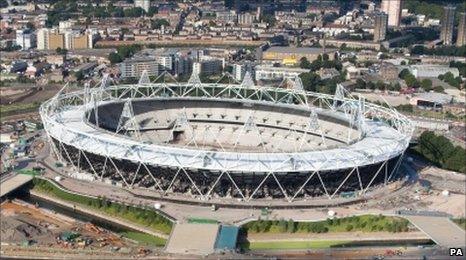West Ham United plan for Olympic stadium 'problematic'
- Published

The Olympic Park Legacy Company will announce its preferred bidder next week
West Ham's plans to keep the running track if the club takes over the Olympic stadium after the 2012 Games will lead to serious problems, it has been claimed.
Michael Cunnah, Wembley Stadium's former chief executive, said football fans would get poor views of the pitch.
West Ham United and Tottenham Hotspur have both submitted bids to occupy the Olympic Stadium after the Games.
The Olympic Park Legacy Company is to decide the winning bid on 28 January.
Cunnah said: "The truth is that an athletics stadium is designed for athletics and if you try and use it for another sport it doesn't work.
"All the sightlines at the Olympic Stadium will be trained onto the running track and not the football pitch.
"Some of the people in the stadium are going to be an awful long way from the football and you need to be able to see both ends of the pitch from every seat - that would be a big issue for West Ham to deal with."
Although Cunnah has spoken out against West Ham's bid it has been backed by ex-sports minister Richard Caborn.
Mr Caborn, sports minister under the previous Labour government, said it would be "daft" to knock the Olympic Stadium down and then rebuild it - and said Tottenham should build closer to its White Hart Lane home.
This follows Tottenham's announcement last week that it wanted to demolish most of the Olympic stadium and build a new ground without a running track.
Tottenham's alternative for athletics is to redevelop and enlarge the existing Crystal Palace stadium - the main home of the sport in the capital over the past few decades - but with only 25,000 seats.
Meanwhile Crystal Palace FC have said that later this week they will unveil potential plans to move from their current ground at Selhurst Park to the national sports centre at Crystal Palace.
The Olympic Park Legacy Company's recommendation for the 2012 site has to be ratified by two government departments - the Department for Culture, Media and Sport, and the Department of Communities and Local Government - and the London mayor's office.
- Published12 January 2011
- Published27 July 2010
- Published26 July 2010